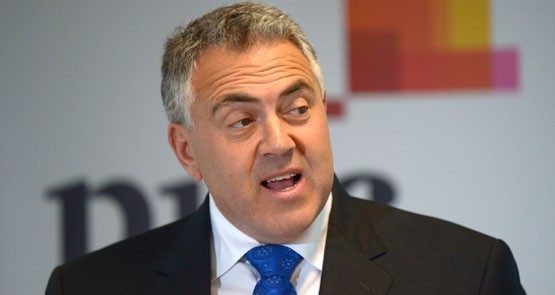
It was with something of the air of the confessional that the head of Treasury’s Macroeconomic Group, Nigel Ray, attended the Australian Business Economists Conference yesterday.
You’ll likely recall that Treasury’s economic growth forecasts in the May budget were criticised at the time, and ever since, for being too optimistic. Now, it turns out, Treasury agrees.
In his speech to the conference, Ray revealed that Treasury now acknowledged they’d got it wrong in forecasting growth to return to 3+% growth over the Forward Estimates. Not because they wanted to make the budget look better, he hastened to add, but because that was the result of their calculations, particularly around population growth.
But, Ray admitted, there had been an internal inconsistency in Treasury’s forecasts around assumptions about unemployment and the take-up of spare capacity in the economy. Treasury had now revised its growth projections and “we now think potential GDP will grow by around 2.75 per cent over the next few years, lower than the 3 per cent estimated at Budget.”
Exactly what the adjusted forecasts are, we’ll find out in the Mid-Year Economic and Fiscal Outlook, whenever that shows up, but it will have an impact — though Ray says not as much as people expected — on revenue, which is already in trouble from weak wages growth and low commodity prices.
Treasury ill-served Wayne Swan with its repeated over-estimates of revenue. Now the Coalition — bearing in mind then-treasurer Joe Hockey once promised that the days of such over-estimates were over, given they were the fault of Labor — is letting down another government.
The downgrading of growth estimates isn’t unexpected — both the Reserve Bank and Treasury itself have been signalling for some months that growth was going to be marked down. But the circumstances are a little unusual. It’s highly unlikely that, in the unfortunate event that Tony Abbott was still prime minister, any such admission of error in the budget by a Treasury official would have been permitted. Abbott was not one for admitting error of any kind, and an admission that his second budget was built on rubbery figures would not have been tolerated. Hockey would have seen to that, just as he rolled over to Abbott on the sacking of Treasury secretary Martin Parkinson.
With Abbott safely dispatched into exile (and his fantasy world where he might yet return to lead the country), and Hockey gone from Parliament, the self-evident truth can be belatedly acknowledged. The RBA, via Governor Glenn Stevens and his deputy Phil Lowe (and the bank’s various set-piece publications on monetary policy), have been casting doubt for much of the past six months on the sustainability of trend growth estimates at or above 3% a year.
Also unusual was that Treasury head John Fraser himself didn’t reveal the downgrade and take responsibility for the inconsistency that Ray says was problematic. Fraser had previously flagged the downgrade, so it wouldn’t have been particularly damning for him to stand up and own it, but it was left to his deputy. Fraser has been the subject of rumours that he would be dispatched by Turnbull, but they appear to have been settled for now with PM&C head Michael Thawley — an even less appropriate Abbott selection than Fraser — being allowed to go back to the private sector and likely to be replaced by Fraser’s predecessor Martin Parkinson.
The installation of Parkinson at PM&C would be a strong signal to the Public Service that the Abbott era of bitter rancour, in which public servants judged to have been too helpful to the previous Labor government were dumped, was over — and Turnbull’s appointment of his former Communications secretary Drew Clarke as chief of staff will help that impression. It will also be uncomfortable for Fraser, who would answer to Parkinson as de facto leader of the APS. And remember Parkinson’s highly regarded deputy at Treasury, David Gruen, is now a deputy at PM&C, to where Abbott moved him, probably because Gruen had demonstrated too much independence and Abbott and his office wanted him on a tighter leash. Parkinson and Gruen would provide a strong internal source of economic advice to Turnbull.
In fact, Fraser now looks increasingly like yesterday’s man — particularly given he seemingly hasn’t had a new economic idea since the early 1990s. Who knows — perhaps Gruen will return to Treasury in a more senior role post-election? In contrast, Reserve Bank governor Glenn Stevens now seems more relaxed, with the threat of Tony Abbott imposing a handpicked outsider on the bank to “fix” it (the AFR‘s Jacob Greber reported in October that Abbott’s office thought the RBA was “fucked up”) safely removed.
Next Tuesday’s final Reserve Bank board meeting for the year is in Perth. Last night, Stevens told economists and others fretting about interest rates to “chill out” and come back early next year and look at the data. That means a quiet final meeting for Roger Corbett, the former CEO of Woolworths (and chair of Fairfax Media) who has just been reinstalled as eminence grise at the troubled grocery retailer. His replacement will tell us much about the way Prime Minister Turnbull and Scott Morrison plan to refresh the RBA board, with a new governor due by next September and two other board slots to be filled.
As for Fraser, perhaps we’ll see more of him come MYEFO, when the full scale of Treasury’s adjustments since May will be revealed.








The problem when the Green/Labor deals were operating wasn’t that Treasury overestimated Revenue, but that Swan et al over-spent with electoral (including to influential powerbrokers)bribes even more expensive than Treasury predicted.
The underlying problem was excessive expenditure not low Revenue flows.
. . . “(and his fantasy world where he might yet return to lead the country}” . . . Dear Lord, Bernard/Glenn, surely you jest?
With the clowns in place roll on the no growth circus.